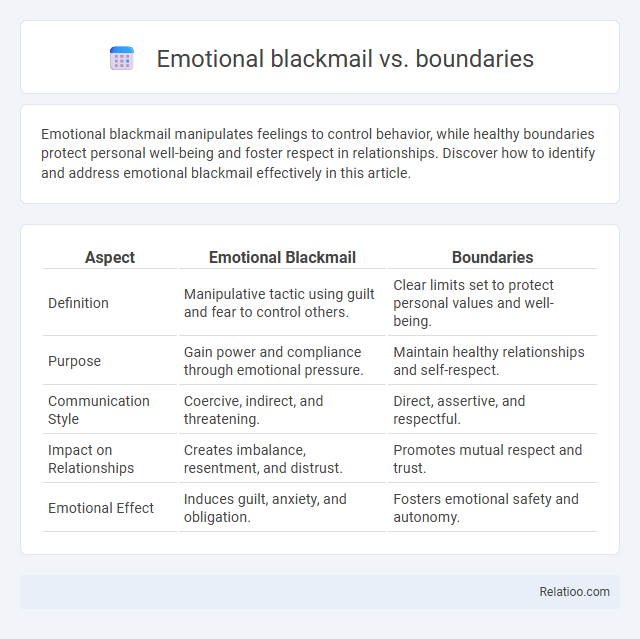Emotional blackmail manipulates feelings to control behavior, while healthy boundaries protect personal well-being and foster respect in relationships. Discover how to identify and address emotional blackmail effectively in this article.
Table of Comparison
| Aspect | Emotional Blackmail | Boundaries |
|---|---|---|
| Definition | Manipulative tactic using guilt and fear to control others. | Clear limits set to protect personal values and well-being. |
| Purpose | Gain power and compliance through emotional pressure. | Maintain healthy relationships and self-respect. |
| Communication Style | Coercive, indirect, and threatening. | Direct, assertive, and respectful. |
| Impact on Relationships | Creates imbalance, resentment, and distrust. | Promotes mutual respect and trust. |
| Emotional Effect | Induces guilt, anxiety, and obligation. | Fosters emotional safety and autonomy. |
Understanding Emotional Blackmail
Understanding emotional blackmail requires recognizing manipulation tactics where one person uses fear, obligation, or guilt to control another's behavior. Unlike healthy boundaries that protect personal limits and promote mutual respect, emotional blackmail undermines autonomy by coercing compliance through psychological pressure. Identifying these differences helps individuals maintain emotional integrity and resist manipulative dynamics effectively.
Defining Personal Boundaries
Personal boundaries define the limits individuals set to protect their emotional well-being and maintain healthy relationships. Emotional blackmail occurs when these boundaries are disregarded through manipulation, guilt, or threats to control behavior. Establishing clear, firm boundaries is essential to resist emotional blackmail and foster respectful, balanced interactions.
Key Tactics of Emotional Blackmailers
Emotional blackmailers use fear, guilt, and obligation as key tactics to manipulate Your decisions and control your behavior. They exploit personal vulnerabilities by making threats, inducing shame, or withdrawing affection to coerce compliance. Recognizing these tactics helps you establish clear boundaries, protecting Your emotional well-being and preventing manipulation.
Signs Your Boundaries Are Being Crossed
Signs your boundaries are being crossed include feelings of guilt, anxiety, or obligation when someone manipulates your emotions to get what they want, a key indicator of emotional blackmail. Recognizing persistent pressure, threats, or guilt-tripping reveals emotional blackmail tactics, distinguishing them from healthy boundary-setting where mutual respect is maintained. Clear boundaries are compromised when your personal limits are ignored, leading to emotional exhaustion and a sense of losing control over your own decisions.
Emotional Manipulation vs. Healthy Communication
Emotional blackmail exploits fear, obligation, and guilt to manipulate others, often undermining healthy communication by bypassing honest dialogue and mutual respect. Boundaries serve as essential tools to protect personal well-being and foster clear, assertive communication that defuses emotional manipulation. Distinguishing emotional blackmail from healthy communication involves recognizing coercive tactics versus respectful expression of needs and limits.
Psychological Impact of Emotional Blackmail
Emotional blackmail exerts significant psychological impact by inducing fear, guilt, and anxiety, often leading to diminished self-esteem and emotional exhaustion. Boundaries serve as crucial protective mechanisms, helping individuals assert their needs and prevent manipulation while promoting mental well-being. Unlike boundaries, emotional blackmail undermines autonomy and creates toxic relational dynamics that can result in long-term trauma and persistent stress.
Setting and Maintaining Strong Boundaries
Setting and maintaining strong boundaries is essential to prevent emotional blackmail, a manipulative tactic where one person uses guilt, fear, or obligation to control another. Clear communication and consistent enforcement of personal limits empower individuals to protect their emotional wellbeing and resist coercion. Healthy boundaries create a framework for mutual respect, reducing vulnerability to emotional manipulation and fostering balanced relationships.
Strategies to Resist Emotional Blackmail
Effective strategies to resist emotional blackmail include establishing clear personal boundaries, recognizing manipulation tactics, and maintaining emotional detachment from the blackmailer's demands. Setting firm limits helps protect mental well-being and empowers individuals to assert their needs without guilt. Consistent communication and seeking support from trusted friends or professionals reinforce resilience against manipulative emotional control.
Rebuilding Confidence After Manipulation
Rebuilding confidence after emotional blackmail involves recognizing your boundaries and asserting them firmly to protect your emotional well-being. Understanding the difference between emotional blackmail and healthy boundaries empowers you to regain control and prevent manipulation from undermining your self-esteem. Strengthening your sense of self and trusting your judgment are key steps toward healing and cultivating resilient personal relationships.
Empowering Yourself Through Assertive Boundaries
Emotional blackmail manipulates your feelings to control your actions, while setting assertive boundaries empowers you to protect your emotional well-being and maintain healthy relationships. Establishing clear limits helps you recognize and resist manipulative tactics, fostering self-respect and confidence. By prioritizing your needs and communicating them firmly, you reclaim control over your emotions and interactions.

Infographic: Emotional blackmail vs Boundaries
 relatioo.com
relatioo.com